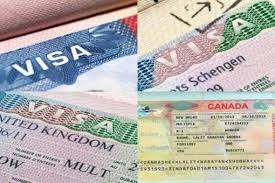… UK, US, Schengen Embassies Rake In Billions From Nigerian Applicants
An investigation has revealed that Nigerians spend over N75 billion every year on non-refundable visa application fees to countries including the United States, United Kingdom, and members of the Schengen area, among others.
Despite the high cost of visa applications, more than 60 per cent of these requests are rejected, forcing many applicants to reapply repeatedly—each time incurring new charges.
PLATFORM TIMES gathered that these rejections result in a massive outflow of funds with no guarantee of travel approval.
For instance, analysis shows that the United States embassy charges N299,700 per applicant. With a conservative estimate of 300 applicants daily, the embassy makes about N89.9 million daily from visa applications in Nigeria alone. Multiplied across working days in a month and year, the total hits over N21.5 billion.
Similarly, UK visa applications for 200 people daily at N279,000 each amount to over N13.3 billion yearly.
This figure excludes those applying for longer-term visas such as the two-year (N969,699), five-year (N1.73 million), and ten-year (N2.16 million) options, many of which are also non-refundable. An estimated 3,000 Nigerians apply for these categories annually.
Schengen visa applications, costing N161,015 each, generate an estimated N11.5 billion annually from Nigerian applicants.
When visa application expenses to other countries like Canada, China, Indonesia, India, and Malaysia are included, the total annual non-refundable payment by Nigerians climbs beyond N75 billion.
Commenting on the trend, a travel consultant who spoke with THISDAY lamented the increasing number of Nigerians applying for visas for social validation rather than necessity. “Many Nigerians apply for visas simply to show off, to keep up with neighbours or relatives. It’s become a symbol of status rather than a real need,” the consultant said.
However, travel experts such as Mrs. Shalom Asuquo, Managing Director of Travel Lab Nigeria Limited, acknowledged that while some Nigerians travel for non-essential reasons, a significant number are genuine travellers seeking business, education, tourism, or medical care abroad.
She noted that countries like Italy, France, Germany, Switzerland, and Denmark attract Nigerians for specific purposes—ranging from fashion and aviation to religion and conferences.
Despite these legitimate reasons, Nigerians face stringent visa requirements and often pay higher fees compared to applicants from other countries. This is largely due to the high demand from Nigerian applicants and rising cases of overstaying and asylum requests, especially among young people.
The drive to emigrate has been fuelled by harsh economic conditions, insecurity, and poor governance. Since 2016, and especially post-2020, more Nigerians—especially youths—have sought to relocate to escape economic hardship and political repression.
A 2023 report by the National Identity Management Commission (NIMC) showed a 563 per cent increase in Nigerians with National Identification Numbers (NINs) living abroad—from 55,181 in 2022 to 366,164 in 2023.
Data from travelanders.com shows that the number of Nigerians with National Identification Numbers (NIN) abroad rose from 55,181 in February 2022 to 366,164 in February 2023 — a spike of 563.57%.
Also data from the Nigerian Immigration Service’s Migration Information Data Analysis System (MIDAS) howed that 2,115,139 Nigerians left the country in 2022, while another 1,574,357 left between January and September 2023—bringing the total to over 3.6 million emigrants in two years.
This mass emigration trend, popularly called Japa — a Yoruba word for “escape” — has become one of the defining characteristics of Nigeria’s socio-political climate in recent years.
Analysts say unless urgent steps are taken by the government to fix the economy, secure the country, and create meaningful opportunities for youth, the trend will continue — and so will the billions lost annually to foreign embassies in visa fees.
“The only way to stop this obsession with travelling abroad is for the government to restore hope. As long as there’s no assurance of a better future here, Nigerians will keep trying to leave — no matter the cost,” a policy analyst said .
Source :Thisday Newspapers
Do you want to share a story with us? Do you want to advertise with us? Do you need publicity for a product, service, or event? Contact us on WhatsApp +2348183319097 Email: platformtimes@gmail.com
We are committed to impactful investigative journalism for human interest and social justice. Your donation will help us tell more stories. Kindly donate any amount HERE




